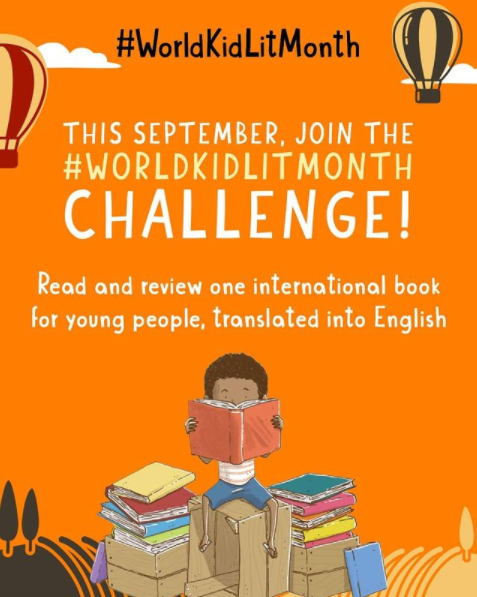World Kid Lit: a growing community

Since 2016, World Kid Lit has provided an interactive experience about children’s books from round the world for children and teens.
2020 was the most successful year to date for the World Kid Lit team, with record numbers sharing reading suggestions and shelfies as well as exploring the World Kid Lit online resources.
Launched as a grassroots initiative in 2016, World Kid Lit aims to celebrate world literature for children and teens, especially fiction, nonfiction and poetry translated to English from other languages. The high point of the year comes in September when we celebrate #WorldKidLitMonth. This month-long focal point creates a space to discuss why we should look beyond the books published in our own country and also how to find books first published elsewhere.
Armchair travel
The reasons to explore world literature are more compelling than ever at a time when physical travel has ground to a halt due to the coronavirus pandemic. They say books are a discount ticket to everywhere, and we can help you choose a country and fly there with a book.
On the World Kid Lit website, you’ll find options to search by country, source language or age group to help you find the perfect book, be it a picture book from Slovenia or a YA novel from Brazil. Some other great websites where you can find out about translated children’s and YA books include:
- Global Literature in Libraries Initiative (GLLI) publishes reviews every Wednesday: #WorldKidLitWednesday
- Outside in World publishes a monthly round-up of book reviews
- Planet Picture Book aims to review picture books from every country of the world
- Juliet’s Book Journey – Juliet is a second grader and voracious reader, who is reading and reviewing a children’s book from every country
If you’re new to reading in translation, the perfect place to start is the lists of prizewinners and honorees of the GLLI Translated YA Book Prize and the Mildred L. Batchelder Prize. The latter of these was awarded in January 2021 to Enchanted Lion Books for Gianni Rodari’s Telephone Tales, illustrated by Valerio Vidali and translated from Italian by Antony Shugaar – an Italian classic that’s been described as a 1960s One Thousand and One Nights and as ‘George Orwell in Wonderland’!
Diversity in publishing and reading
World Kid Lit exists to assert translated literature as a topic within the broader discussion of diversity and inclusion in children’s publishing, but also to improve the ethnic and linguistic diversity within what is translated.
There are many websites and initiatives that highlight publications set in other countries or non-fiction books about other cultures, and indeed diverse writing by authors in English from other countries, but World Kid Lit aims to make the case for reading books in English translation by authors who don’t themselves write in English. Given that only about 5% of the world’s population has English as a first language, including translated books in our reading diet opens up a window to a much wider world.
Global reading for a global outlook
There is so much potential for translated books to play a part in opening young people’s minds to global perspectives. It’s not only a matter of what we read that makes a difference, but also the very fact that we choose to read authors who have lived experience of societies other than our own.
When we include books from beyond our shores and translated from other languages on our children’s bookshelves, in our libraries and classrooms, then we demonstrate the value of listening to those in other communities, those who see the world from another vantage point. It’s a way of valuing collaboration beyond and across language barriers – all the more important in a time of pandemic and global crises.
Found in translation
All too often overlooked, translation is a form of co-authorship, an artistic craft and a life tool that we are keen to demystify and celebrate during World Kid Lit Month, and indeed all year round in the World Kid Lit community. We often hear that the biggest hurdles to translating books from other countries are hearing about books from other countries, finding a reader to assess a manuscript in another language and finding a translator.
Among our resources is a page of resources for publishers including useful information and a downloadable list of expert readers and translators. 2021 sees the relaunch of our Translate This! area under the title Rights Available – a collection of book reviews to help publishers in their hunt for the next great book, and at the same time, showcase the knowledge and talents of translators working with children’s books.
Broadening the focus
One thing that has become evident through our annual publications list is the dominance of Western European languages in the children’s books that have made it into the English language. We are keen to encourage translations and translators from languages that are less represented on our children’s bookshelves.
During #WorldKidLitMonth 2020, we hosted our first online panel discussions, the first with worldwide publishers and the second with translators working within the field. Managed by Mohini Gupta and hosted by Marcia Lynx Qualey, these events were a huge success, attracting hundreds of viewers. This led to the creation of our first language-specific discussion, bringing together authors, translators, academics and literary professionals working with Arabic. Alexandra Büchler of Literature Across Frontiers said of the event:
“The response shows that you have tapped into a strong need in the Arabic speaking world and that there is lack of opportunities to debate the topic.”
In 2021, we will be continuing our language and region-specific panel discussions, focusing on lesser-represented languages. Current plans include languages from Central Europe, India and Africa, among others.
Become a World Kid Lit champion
This year, we had more librarians and bookshops joining the discussion than ever before, posting ‘shelfie’ pictures and mini reviews of the translated YA and children’s titles on their shelves. We actively welcome new contributors to the World Kid Lit blog, particularly from people championing languages that are less represented in English translation. So if you’re interested in translated books for children and young people, please get in touch.
Bon voyage, wherever your reading takes you!
Contact details:
Website: www.worldkidlit.wordpress.com
Email: worldkidlit@gmail.com
Twitter: @worldkidlit
Instagram: @worldkidlit
Facebook Page: www.facebook.com/worldkidlit
Facebook Community Group: World Kid Lit: Translated Books for Children and YA
